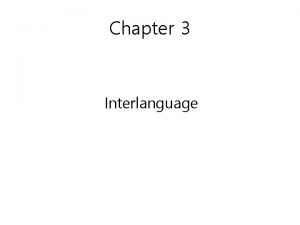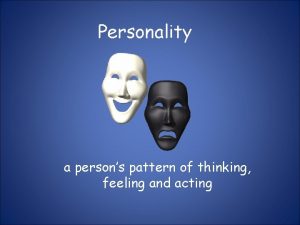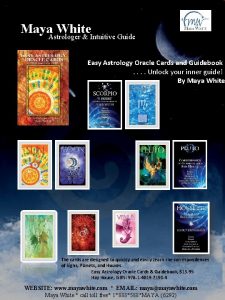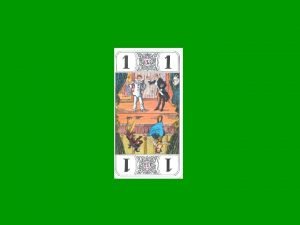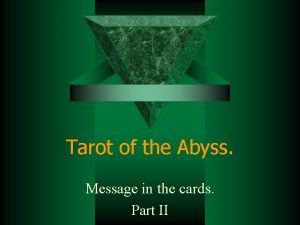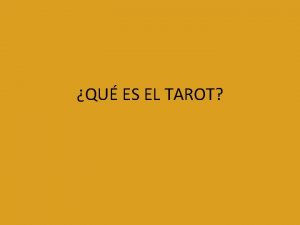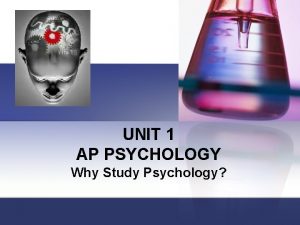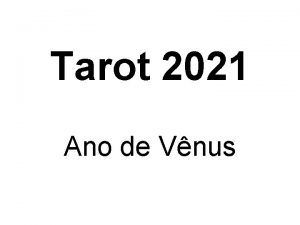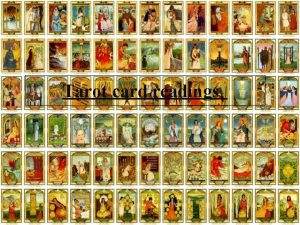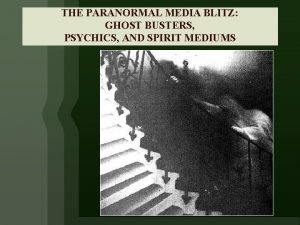What Psychology is not Psychics Mentalist Astrologer Tarot










- Slides: 10

What Psychology is not! Psychics Mentalist Astrologer Tarot Readers

Parapsychology "Most sciences try to explain observable phenomena. Parapsychologists try to observe unexplainable phenomena. ”

Parapsychology The study of certain reported but unsubstantiated events that have no presently known explanation. It seeks to investigate the existence and causes of psychic abilities, near-death experiences, and life after death using the scientific method. ESP: Extrasensory Perception ESP is the most testable and well known area of parapsychology Often referred to as the “ 6 th sense. ” 3 main types of ESP Telepathy Clairvoyance Precognition

Telepathy A telepath would be a person with the paranormal ability to read others' thoughts and mental contents. It may involve one person sending thoughts to another or perceiving another's thoughts without using any of the five recognized senses. Term was coined by F. W. Myers in 1882. Popularized by fictional novels and movies.

Clairvoyance French for “clear seeing” The ability to “see” information about people, objects, or locations without using any of the five senses. Includes crystal gazing and tea leaf reading.

Precognition Knowledge of a future event or circumstance not obtained by inference or deduction, but by paranormal means. Precognition is what most people mean when using the term “psychic. ” Dream interpretation Many people believe dreams predict the future Ex. Joseph in the Old Testament The Bible refers to precognitive dreams. There are about 15 in the old testament - most of which helped change the course of history, and there is the one mentioned earlier in this book of the Pharaoh who dreamed of 7 fat and 7 thin cattle. Joseph decoded it as referring to seven years of abundance followed by 7 years of famine - warning of future events.

'I h a mo d a re c t see her, w urring h wer Doug o was dream a em y b nd Jo dead i every y roth n n The er a again realit ight fo y. nd my dream hi They , paid r a we hus s w e bou ban was v ife will n a visit k. In t e g. d h ot told ry di The ht th be and to e dre s e y q m her uie en ho had local e l ld me. am my ting o lid bee p t ong and ay. 'Y n aper to be '. ' kil a Dou ou wil led nd on so 'si I want g a lly'. ed fly nd l not t t h Two ow ing Joy e f arn ron to d t a m Spa in. page ys aft y br w e o I h ad ere my r ther b no ide broth last d ut a t hey er and ream I had J gon oy. e o n

Testing Bem ESP and Honorton’s Ganzfeld Studies “Because a good magician can do something shouldn't make you right away jump to the conclusion that it's a real phenomenon. ” - Richard Feynman Ganzfeld experiments (ganzfeld is German for "whole field") have been around in some form since the 1930 s. The studies that drew the most recent attention were done by Daryl Bem, a Cornell University psychologist, and Charles Honorton, a University of Edinburgh parapsychologist. Ganzfeld experiments involve covering a subject's eyes (generally with halves of ping-pong balls), bathing them in a red floodlight, and feeding white noise through headphones into their ears. This supposedly makes the subjects unable to receive sensory information. Then another person in a room shielded from the first subject tries to mentally send a specific picture. The first subject re whatever imagery comes to mind and then tries to identify which of a group of pictures the second person was trying to send via ESP. The idea here is that ESP is such a weak force, it is normally drowned out by our other senses. So with all other sensory input suppressed, the subject should be able to better use ESP. Bem and Honorton used meta-analysis to combine the results of several studies, and found a hit rate of about 35%--enough above the expected chance rate of 25% to be significant, if true.

What the Skeptics Say After thousands of experiments, a reproducible ESP phenomenon has never been discovered, or has anyone produced any individual who can convincingly demonstrate psychic ability. A National Research Council investigation of ESP concluded that "the best available evidence does not support the contention that these phenomena exist. ” “the best scientific evidence does not justify that ESP -that is, gathering information about objects or thoughts without the intervention of known sensory mechanisms- exists. ”

Parapsychologist also study: Psychokinesis : Also called PK; direct mental interaction with physical objects, animate or inanimate. Bio-PK : Direct mental interactions with living systems. NDE : Near death experience; an experience reported by those who were revived from nearly dying. Often refers to a core experience that includes feelings of peace, OBE, seeing lights and other phenomena. OBE : Out-of-body experience; the experience of feeling separated from the body, often accompanied by visual perceptions as though from above the body. Reincarnation: The belief that we live successive lives, with primarily evidence coming from the apparent recollections of previous lives by very small children. Haunting : Recurrent phenomena reported to occur in particular locations that include apparitions, sounds, movement of objects, and other effects. Poltergeist: Large-scale PK phenomena often attributed to spirits, but which are now thought to be due to a living person, frequently an adolescent.
